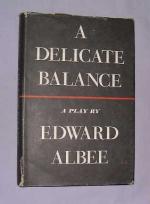|
This section contains 515 words (approx. 2 pages at 400 words per page) |

|
A Delicate Balance: A Play Summary & Study Guide Description
A Delicate Balance: A Play Summary & Study Guide includes comprehensive information and analysis to help you understand the book. This study guide contains the following sections:
This detailed literature summary also contains Bibliography and a Free Quiz on A Delicate Balance: A Play by Edward Albee.
In 1994, after enduring a lull in his theatrical career, Edward Albee won his third Pulitzer Prize for drama. In 1996, Edward Albee's play, A Delicate Balance, celebrating its thirtieth birthday on Broadway, won a Tony Award for the best revival play of the year. Together, these awards mark the enduring qualities of both the playwright and his play.
A Delicate Balance was first produced at the Martin Beck Theatre on Broadway on September 12, 1966. It came four years after Albee's other huge Broadway hit Who's Afraid of Virginia Woolf? (1962). Both of these plays deal with a recurring theme of Albee's, which entails a sense of missed opportunity and loss. Both plays also deal with dysfunctional relationships. Both were commercial successes, more easily understood and appreciated by general audiences than Albee's previous and intermediate plays that leaned toward the absurd. One main difference between the two plays is that Who's Afraid of Virginia Woolf? is known as the play that almost won the Pulitzer (it was nominated, but one of the Pulitzer committee members deemed its language and subject matter too crude), whereas A Delicate Balance did win the coveted prize.
Albee's career took a slight downturn after the success of Who's Afraid of Virginia Woolf?, at least in reference to audience appeal and critical approval. It wasn't until the production of A Delicate Balance that Albee would again enjoy popular, critical, and financial success. Although A Delicate Balance won Albee his first Pulitzer Prize, most critics at the time considered the play, as Steven Drukman writes in American Theatre, to be one of Albee's "last gasps." Although it would not be Albee's last gasp, Albee would have to wait almost ten years before he would win his second Pulitzer (for Seascape [1975]) and then again almost another twenty years before he would again claim the prize for his Three Tall Women (1994).
Despite his erratic successes, Albee has had an extremely significant impact on American theater. His play A Delicate Balance has often been credited with creating an archetype for American drama with its classic study of the American family, albeit a quite dysfunctional one. The play looks into the confusion that erupts in a modern family's attempt to avoid pain and discomfort, which, as Albee demonstrates, only creates more pain and discomfort. The play's major themes are denial of emotions (and often reality itself), loss of opportunities and potential, and regret over paths not taken as reflected in the lives of a very well-to-do suburban couple who have retired but find their long-sought freedom about to collapse. In the period of one weekend, their home comes under attack by emotionally wounded family members and friends, who, in the end, expose the couple's own emotional insecurities. The scenes are not easy for audiences to take, but, as Albee states in an interview with Richard Farr in The Progressive:
If I wrote plays about everyone getting along terribly well, I don't think anyone would want to see them. . . . You have to show people things that aren't working well . . . in the hope that people will make them work better.
Read more from the Study Guide
|
This section contains 515 words (approx. 2 pages at 400 words per page) |

|



